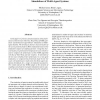Free Online Productivity Tools
i2Speak
i2Symbol
i2OCR
iTex2Img
iWeb2Print
iWeb2Shot
i2Type
iPdf2Split
iPdf2Merge
i2Bopomofo
i2Arabic
i2Style
i2Image
i2PDF
iLatex2Rtf
Sci2ools
125
click to vote
PADS
2006
ACM
2006
ACM
Analysing the Performance of Optimistic Synchronisation Algorithms in Simulations of Multi-Agent Systems
In this paper we present a detailed analysis of the performance of the Decision Theoretic Read Delay (DTRD) optimistic synchronisation algorithm for simulations of Multistems. We develop an abstract characterisation of the access patterns found in MAS simulations based on the simulation’s degree of coupling and skew. Using this characterisation, we generated stereotypical test cases which we used to compare the performance of the DTRD algorithm with that of Time Warp and time windows. To determine if the test cases reliably predict performance in a real agent simulation, we compared the predictions made by the test cases with performance results from the Boids agent simulation benchmark for a range of simulation parameters. The results indicate that DTRD adapts to the mixtures of coupling cases found in real agent simulations and is capable of tracking changes in coupling during the simulation.
| Added | 14 Jun 2010 |
| Updated | 14 Jun 2010 |
| Type | Conference |
| Year | 2006 |
| Where | PADS |
| Authors | Michael Lees, Brian Logan, Dan Chen, Ton Oguara, Georgios K. Theodoropoulos |
Comments (0)

